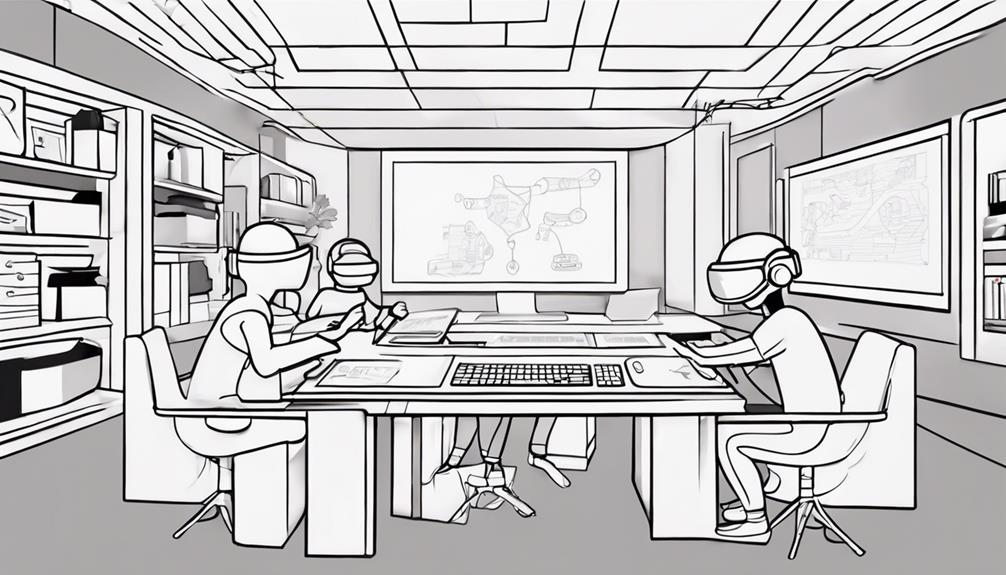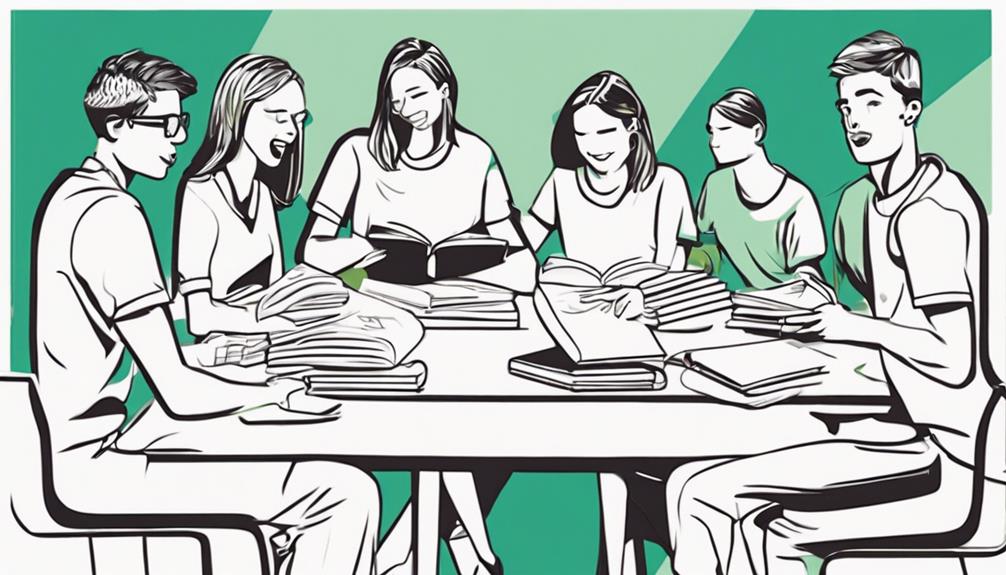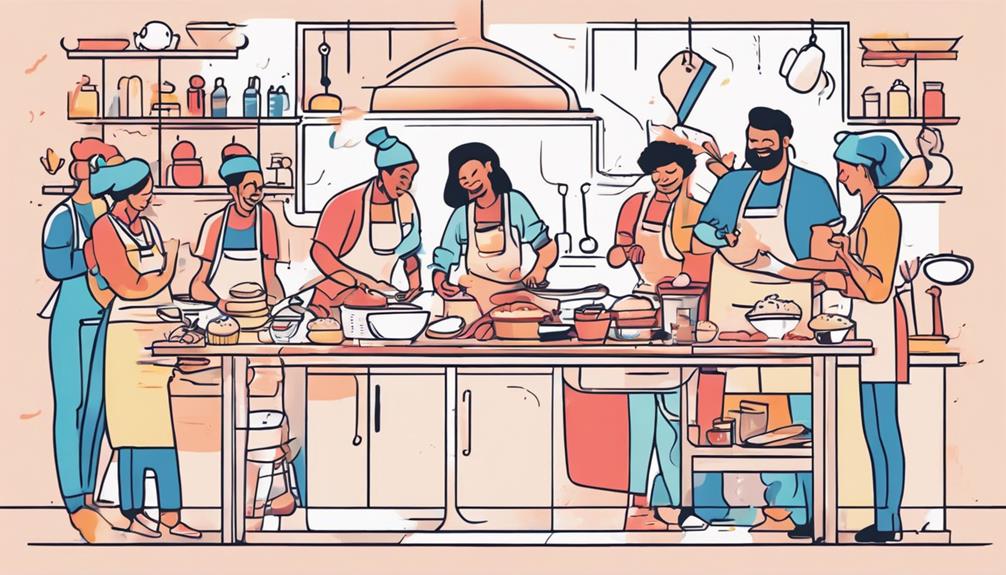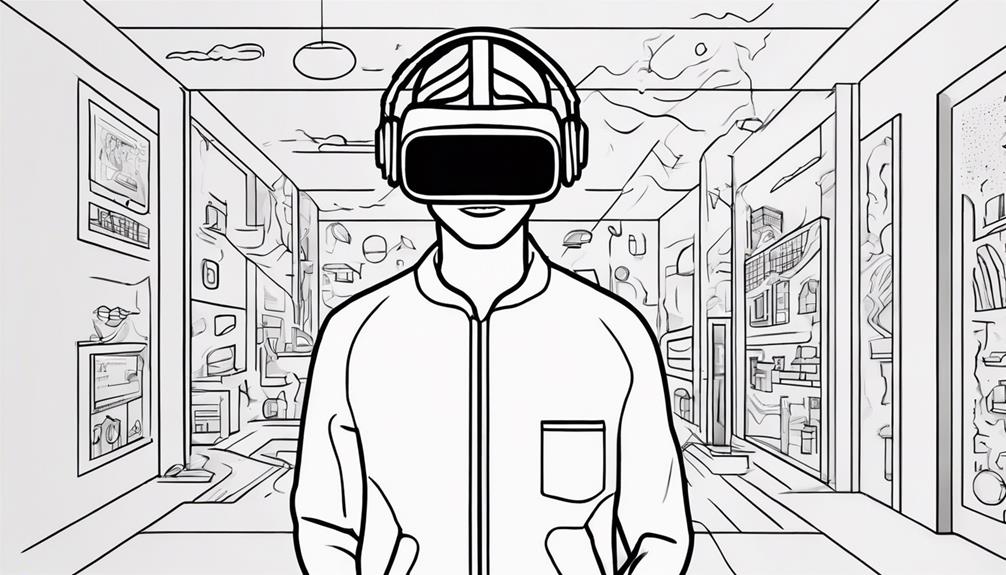Exploring innovative and engaging methods to facilitate learning can significantly enhance educational outcomes. From interactive online courses to creative arts and crafts projects, the realm of fun learning is vast and diverse. Activities like outdoor experiential learning or immersive virtual reality experiences offer unique avenues for knowledge absorption. Group study sessions, educational board games, and even cooking workshops can stimulate intellectual curiosity and foster a deeper understanding of various subjects. Embracing unconventional approaches in education not only adds excitement but also cultivates a dynamic learning environment that resonates with diverse learning styles.
Key Takeaways
- Interactive online courses and virtual reality experiences make learning engaging and interactive.
- Creative arts, DIY projects, and cooking workshops enhance skills through hands-on activities.
- Collaborative learning in group study sessions, board games, and escape room challenges promotes teamwork.
- Outdoor experiential learning fosters critical thinking and environmental awareness in natural settings.
Interactive Online Courses

Interactive online courses revolutionize learning by offering a dynamic platform that integrates multimedia resources and real-time interaction to enhance the educational experience. These courses provide engaging multimedia content such as videos, quizzes, and interactive activities, making the learning process more interactive and stimulating. Learners can interact with instructors and peers through discussion forums and live sessions, fostering a collaborative learning environment.
One significant feature of interactive online courses is self-paced learning, allowing individuals to progress through the material at their own speed. This flexibility accommodates various learning styles and schedules, enabling learners to study when it is most convenient for them. Furthermore, online courses often offer certificates upon completion, recognizing the learner's efforts and enhancing their skills and credentials.
Platforms like Coursera, Udemy, and Khan Academy host a diverse array of interactive online courses, catering to a wide range of subjects and interests. These courses provide an effective and engaging way for individuals to acquire new knowledge and skills in a flexible and convenient manner.
Creative Arts and Crafts
Engaging in creative arts and crafts activities offers individuals the opportunity to explore their artistic abilities and express themselves through various mediums. From DIY projects to crafting sessions, participants can enhance their skills while enjoying the educational aspect of these endeavors. By immersing oneself in painting, drawing, music, dance, and storytelling, individuals can foster creativity, imagination, and practical skills in a fun and interactive manner.
DIY Projects for Learning
Crafting educational projects through do-it-yourself (DIY) methods can enhance learning outcomes in creative arts and crafts. Students can have fun while engaging in DIY projects like creating colorful flashcards to aid in vocabulary learning. By making educational crafts such as a solar system model for science lessons, students not only grasp the concepts better but also enjoy the hands-on experience. These activities also help in developing critical thinking skills, for example, by crafting a timeline of historical events. Additionally, DIY projects like building a simple machine model for physics concepts encourage creativity and fine motor skills. Through these engaging and interactive projects, students can explore various subjects in a fun and effective manner.
Artistic Expression Exploration
Artistic expression exploration through creative arts and crafts offers valuable avenues for individuals to delve into diverse forms of self-expression and creativity. Engaging in drawing, painting, and crafting projects allows one to express themselves visually. Music and dance activities serve as a dynamic form of creative expression, encouraging movement and rhythm. Furthermore, drama and storytelling sessions provide platforms for individuals to explore their imagination and emotional range through acting out narratives. Incorporating hands-on activities like painting, knitting, or crocheting into artistic exploration not only enhances artistic skills but also fosters a sense of accomplishment and creativity. Creative arts and crafts play a crucial role in enhancing learning experiences by stimulating creativity and providing outlets for artistic expression.
Crafting for Educational Fun
Utilizing creative arts and crafts in educational settings can significantly enhance cognitive development and learning outcomes. Crafting activities such as painting, drawing, and sculpting offer fun ways to learn while stimulating creativity and improving fine motor skills. Engaging in crafts not only fosters focus, concentration, and problem-solving abilities but also promotes self-expression and emotional well-being through artistic exploration. Hands-on crafting projects play a crucial role in developing hand-eye coordination and spatial awareness in learners. By incorporating crafting into educational practices, abstract concepts can be made more tangible and memorable, facilitating a deeper understanding of various subjects. Therefore, crafting for educational fun serves as a valuable tool for holistic development and effective learning experiences.
Outdoor Experiential Learning
Outdoor experiential learning is a dynamic approach that immerses learners in natural settings, enabling firsthand encounters with the environment. Through activities like nature hikes and role-playing in nature, students actively engage with the ecosystem, fostering critical thinking and a sense of environmental stewardship. This hands-on method not only enhances academic skills but also cultivates a profound connection to the natural world, emphasizing the importance of experiential learning in education.
Nature Hikes for Learning
Engaging in guided nature hikes provides an immersive educational experience that deepens understanding of natural ecosystems and wildlife.
- Participants have the opportunity to observe and interact with diverse flora and fauna in their natural habitats.
- Guided discussions during the hike help learners grasp complex ecological concepts in a tangible setting.
- Hands-on activities such as wildlife tracking or plant identification enhance experiential learning.
Nature hikes not only offer a break from traditional classroom settings but also stimulate curiosity and a sense of wonder about the natural world. Through this outdoor experiential learning, individuals can develop a profound connection to the environment, fostering a deeper appreciation for conservation efforts and sustainable practices.
Role-Playing in Nature
Immersing students in role-playing scenarios set in natural environments serves as a valuable method for enhancing their comprehension of environmental concepts and fostering a deeper connection with nature. Through outdoor experiential learning, students engage in hands-on activities that encourage them to embody various roles related to nature, such as plants, animals, or environmental activists. This approach not only stimulates creativity and critical thinking but also enables students to explore ecological relationships, conservation practices, and sustainability issues in a tangible way. The table below illustrates the benefits of role-playing in nature for students:
| Benefits of Role-Playing in Nature |
|---|
| Enhances comprehension of environmental concepts |
| Fosters a deeper connection with nature |
| Promotes creativity and critical thinking |
| Develops empathy and problem-solving skills |
Group Study Sessions

Within educational settings, group study sessions have been recognized as a valuable method for fostering collaborative learning and knowledge sharing among peers. When students come together to study in groups, several benefits arise:
- Enhanced Collaborative Learning: Group study sessions provide opportunities for students to discuss challenging concepts, share different perspectives, and collectively clarify doubts. This collaborative effort can lead to a deeper understanding of the subject matter.
- Increased Motivation: Working in a group setting can boost motivation levels as students encourage and support each other. The shared goal of understanding the material can be a powerful motivator for participants to stay focused and engaged.
- Accountability: Group study sessions create a sense of accountability among participants. Knowing that others are relying on them to contribute to the group's learning can encourage individuals to stay committed to the study session and actively participate.
These aspects of group study sessions contribute to an enriching educational experience that promotes active learning, critical thinking, and social interaction among peers.
Educational Board Games
Group study sessions have long been recognized as a valuable method for fostering collaborative learning among peers, and a similar approach to enhancing critical thinking skills and academic growth is through educational board games. Educational board games offer a fun way to engage with different subjects such as math, science, and history while also promoting social interaction, teamwork, and strategic thinking among players. These games provide a hands-on approach to learning, allowing players to apply concepts in a practical setting. Moreover, many educational board games are designed to align with curriculum standards, making them a valuable tool for academic development.
Cooking and Baking Workshops

Participating in cooking and baking workshops provides individuals with practical experience in culinary arts and fosters the development of fundamental cooking skills. These workshops delve into various aspects of culinary skills, from mastering baking techniques to understanding flavor profiles and ingredient combinations. Participants not only enhance their cooking abilities but also gain valuable knowledge in food safety practices and kitchen organization. Through hands-on activities and expert guidance, individuals can explore different cuisines, baking techniques, and culinary traditions, expanding their culinary horizons. Cooking and baking workshops not only equip participants with the skills needed to create delicious dishes and desserts but also promote creativity, teamwork, and a deeper appreciation for food. Overall, these workshops offer a dynamic learning environment where individuals can enhance their culinary skills while immersing themselves in the art of cooking and baking.
- Hands-on experience in preparing various dishes and desserts
- Learning essential culinary skills like knife techniques and food safety practices
- Insights into flavor combinations, ingredient selection, and cooking methods
Escape Room Challenges
Exploring immersive and interactive escape room challenges offers participants a unique opportunity to engage in hands-on problem-solving activities that require teamwork and critical thinking skills. These challenges are designed to immerse players in a themed environment where they must work together to decipher codes, unlock locks, and uncover hidden clues within a set time limit. Success in escape rooms hinges on effective communication, collaboration, and the ability to think outside the box.
Participants are thrust into scenarios where they must use their collective skills to progress through the game, making it an ideal setting for fostering teamwork and enhancing problem-solving abilities. The immersive nature of escape room challenges captivates players, drawing them into a world where their actions directly impact their success.
Virtual Reality Learning Experiences

Incorporating virtual reality technology into educational settings revolutionizes the learning experience by providing students with immersive environments that enhance engagement and interaction with educational content. Virtual reality learning experiences offer interactive ways to engage students in learning, such as:
- Immersive Environments: Virtual reality creates realistic simulations that transport students to different worlds, historical eras, or scientific phenomena, making learning more engaging and memorable.
- Interactive Engagement: Through VR technology, students can actively participate in lessons, manipulate objects, and conduct experiments, fostering a deeper understanding of complex concepts.
- Enhanced Learning Outcomes: Virtual field trips and simulations allow students to visualize abstract ideas, improving comprehension and retention of information in a more effective manner.
Frequently Asked Questions
How Can I Make Learning Fun?
To make learning fun, incorporate hands-on activities, games, interactive lessons, projects, and immersive experiences. These methods engage students by stimulating different senses and encouraging active participation. By integrating interactive tools and real-world simulations, students can grasp concepts in a more practical and engaging manner. Creating a dynamic learning environment with varied activities and stations will maintain student interest and enhance their overall learning experience.
What Is a Fun Learning Experience?
A fun learning experience typically involves interactive games, hands-on experiments, and outdoor exploration to engage learners actively. These activities stimulate curiosity, encourage participation, and enhance retention of information. By providing a dynamic and engaging environment, fun learning experiences can foster a deeper understanding of concepts and promote a love for learning. Incorporating elements of play and creativity into educational activities can make the learning process enjoyable and exciting for individuals of all ages.
How Can I Learn Interesting Things?
To learn interesting things, individuals can engage in interactive games and hands-on activities that promote experiential learning. Creative projects and educational experiments offer opportunities to explore new concepts in a fun and engaging manner. Additionally, embarking on outdoor adventures provides experiential learning opportunities that foster curiosity and discovery. These methods enable individuals to acquire knowledge in an enjoyable and memorable way, making the learning process engaging and rewarding.
How Can I Have Fun Studying?
To have fun studying, incorporating interactive games, creative projects, and group activities can enhance engagement and enjoyment. These methods provide opportunities for hands-on learning, collaboration, and problem-solving, making the study process more dynamic and entertaining. By integrating these elements into study sessions, individuals can maintain interest, boost motivation, and retain information more effectively. Embracing these interactive and creative approaches can transform studying into an enjoyable and rewarding experience.
Conclusion
In conclusion, incorporating fun and interactive learning methods can greatly enhance the educational experience for students. By engaging in activities such as interactive online courses, creative arts and crafts, and outdoor experiential learning, students can deepen their understanding and retention of information. Just as a picture is worth a thousand words, these engaging learning experiences can paint a vivid picture in students' minds, making learning both enjoyable and effective.
